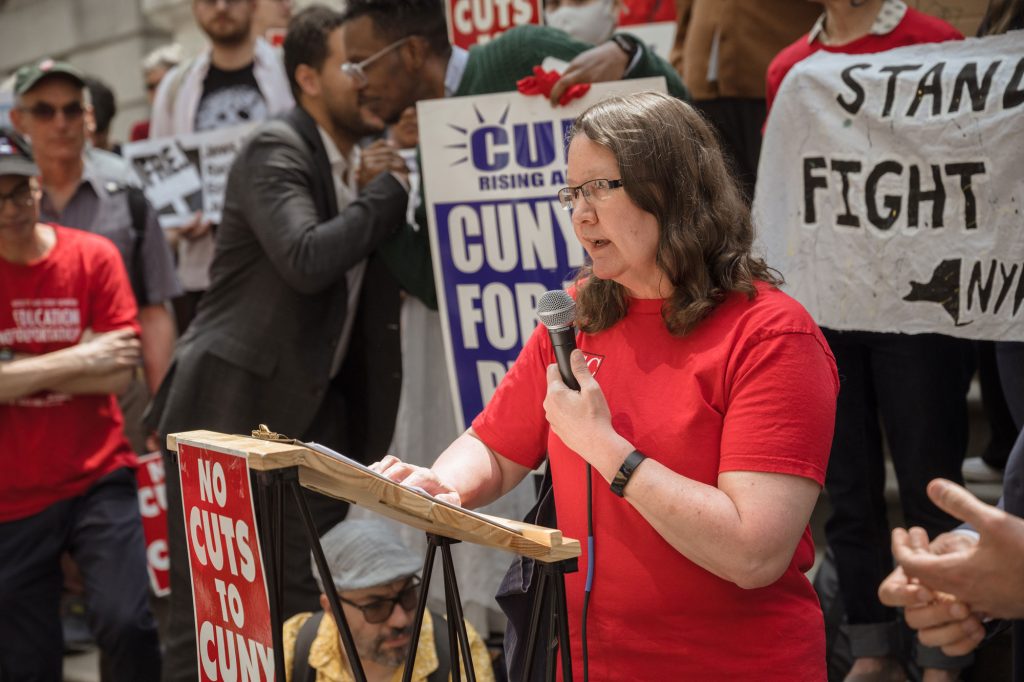“That program is incredible – we’re looking to adopt it at our college.” Last month, we were sitting across the table from educators from around the state, listening to them praise one of the most successful college initiatives in the City University of New York’s history. In our roles as CUNY community college professors and union leaders, we had traveled to the New York State United Teachers conference in Saratoga Springs to share strategies for strengthening higher education opportunities for the most vulnerable students – those at community colleges.

Sharon Utakis, the union’s vice president for community colleges, speaks out against budget cuts. Photo credit: Scott Heins
Amid conversations about equity, health and safety, and academic freedom in the context of strong contracts, our colleagues singled out the one program that was so successful that others are adopting it – not just in New York but nationwide. And what are we doing? Dismantling it.
CITY CUTS
Mayor Eric Adams has just announced another 5% cut to all city agencies, including CUNY. And CUNY management has decided that our cut will come out of one of our most successful community college initiatives – the Accelerated Study in Associate Programs, or ASAP.
Our colleagues, through their anger, echoed two major concerns: CUNY has been underfunded for so long that it is hard to imagine how it could survive any additional cuts and the irony of targeting such a celebrated and successful program.
“Taking textbooks out of the hands of the most marginalized students? That’s where these administrators with their bloated salaries think is the best place to cut!”
Since 2007, CUNY’s ASAP has increased graduation rates for thousands of students. The program was designed to provide financial, academic and personal support to help students complete their degrees as soon as possible. It has provided students with MetroCards, textbook vouchers, early registration, consolidated schedules, a tuition waiver for any gap between full-time tuition and fees and their financial-aid award, and dedicated ASAP advisers (and, in its early stages, reduced class sizes).
Graduation rates increased dramatically, and the ASAP model has been touted by CUNY around the country. But now all of that could be changing.
STUDENT SUPPORTS
ASAP was developed in response to research showing that the reason many students don’t make it through college is not because they aren’t smart, capable or diligent – it’s because they don’t have the supports necessary to focus on their programs of study. “The community-building is a vital part of keeping students enrolled in college and moving forward,” says Salvatore Pisciotta, who began working at Queensborough Community College as an English tutor in 2015 and now works as an ASAP adviser. “Our conversations are holistic, ensuring students are not only doing well academically, but that they are receiving necessary services within the community as well. Many students report never having had the kind of support that ASAP offers.”
IMPACT ON STUDENTS
Elizabeth Stevenson, a senior adviser for ASAP at City Tech, explains the deep impacts of cuts to the program: “When students have to wait for answers to basic questions or can’t access services at all, they struggle to enroll properly, to get the aid they need, to get the support they need and to complete their degrees. That’s not just bad for CUNY students, that’s bad for all of New York City, which honestly couldn’t function without CUNY graduates. ASAP [and] ACE [CUNY’s Accelerate, Complete, Engage program] are the best interventions we have.”
There has been some discussion among top CUNY administrators that ASAP is too expensive. But the data shows that this investment pays off.
Lori Ungemah, professor of interdisciplinary studies at Guttman Community College, the newest CUNY college to use ASAP as a blueprint for its high-touch model, remembers how the free MetroCard was so impactful that students included it in their essays. “They would write how the financial impact of that monthly unlimited [card] affected them so greatly that it kept them motivated,” she says.
“The MetroCard gave the student and family such financial relief, and that allowed them the brain space to focus on their academics. We think of our public transportation system in New York City as a liberating, unifying space, [but] we forget the cost per swipe is still prohibitive for many people. Who knows how many students CUNY could serve if the City continued to give free MetroCards to those enrolled in a public institution of higher education part- or full-time.”
FUND THE PROGRAM
Members of our faculty and staff union, the Professional Staff Congress, are working hard to convince the mayor and other city leaders to fund a program that has been life-changing for our students and a boon to our city. As CUNY and so many other colleges struggle to maintain enrollment, we can celebrate having record numbers of students at CUNY this fall, but if students can’t access the proven supports they need to persist and succeed, these numbers mean little.
Our students are not just numbers on a page. If CUNY is to continue to act as the great engine of social mobility that it has been shown to be, the mayor should continue to fund the successful programs that help CUNY students graduate.
Kristina Baines is the PSC chapter chair at Guttman Community College and Sharon Utakis is the PSC vice president for community colleges. A version of this article originally appeared in AFT Voices.
Published: February 27, 2024

